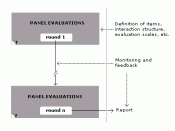Business forecasting is the process of studying historical performance for the purpose of using the knowledge gained to project future business conditions so that decisions can be made today that will aid in the achievement of established goals. Forecasting plays a crucial role in today's uncertain global marketplace. Forecasting is traditionally either qualitative or quantitative, with each offering specific advantages and disadvantages.
Qualitative and Quantitative Forecasting TechniquesForecasting can be classified into qualitative and quantitative. Qualitative techniques are subjective or judgmental and are based on estimates and opinions. The Delphi technique, a common form of qualitative forecasting, allows experts to create an effective forecast under conditions of extreme uncertainty. Time's series forecasting, a quantitative technique, uses a statistical analysis of past sales in order to effectively predict future outcomes, but can be limited under conditions of uncertainty (Chase, 2003, p.364).
Business forecasting can be used in a wide variety of contexts, and by a wide variety of businesses.
For example, effective forecasting can determine sales based on attendance at a trade show, or the customer demand for products and services (Business and Economic Forecasting, p.1). One of the most important assumptions of business forecasters is that the past acts as an important guide for the future. It is important to note that forecasters must consider a number of new information, including rapidly changing economic conditions and globalization, when creating business forecasts based on past sales. Globalization and economic slowdown has made businesses subject to a great deal of uncertainty. In this time of rapid change, economies worldwide change rapidly, new markets open up and old ones change, and demand for products is often uncertain. As such, businesses must be flexible and adaptable in the types of methods that they use to forecast future sales (Chase, 2003, p.472).
In an ever-changing...


